More Coverage
Twitter Coverage
Satyaagrah
Written on
Satyaagrah
Written on
Satyaagrah
Written on
Satyaagrah
Written on
Satyaagrah
Written on
JOIN SATYAAGRAH SOCIAL MEDIA
British author Tunku Varadarajan tried to tarnish the image of iconic freedom fighter Netaji with reference to Hitler: Sinister agenda to malign the legacy of Netaji from calling him a ‘flawed hero’ to a ‘Nazi sympathiser’
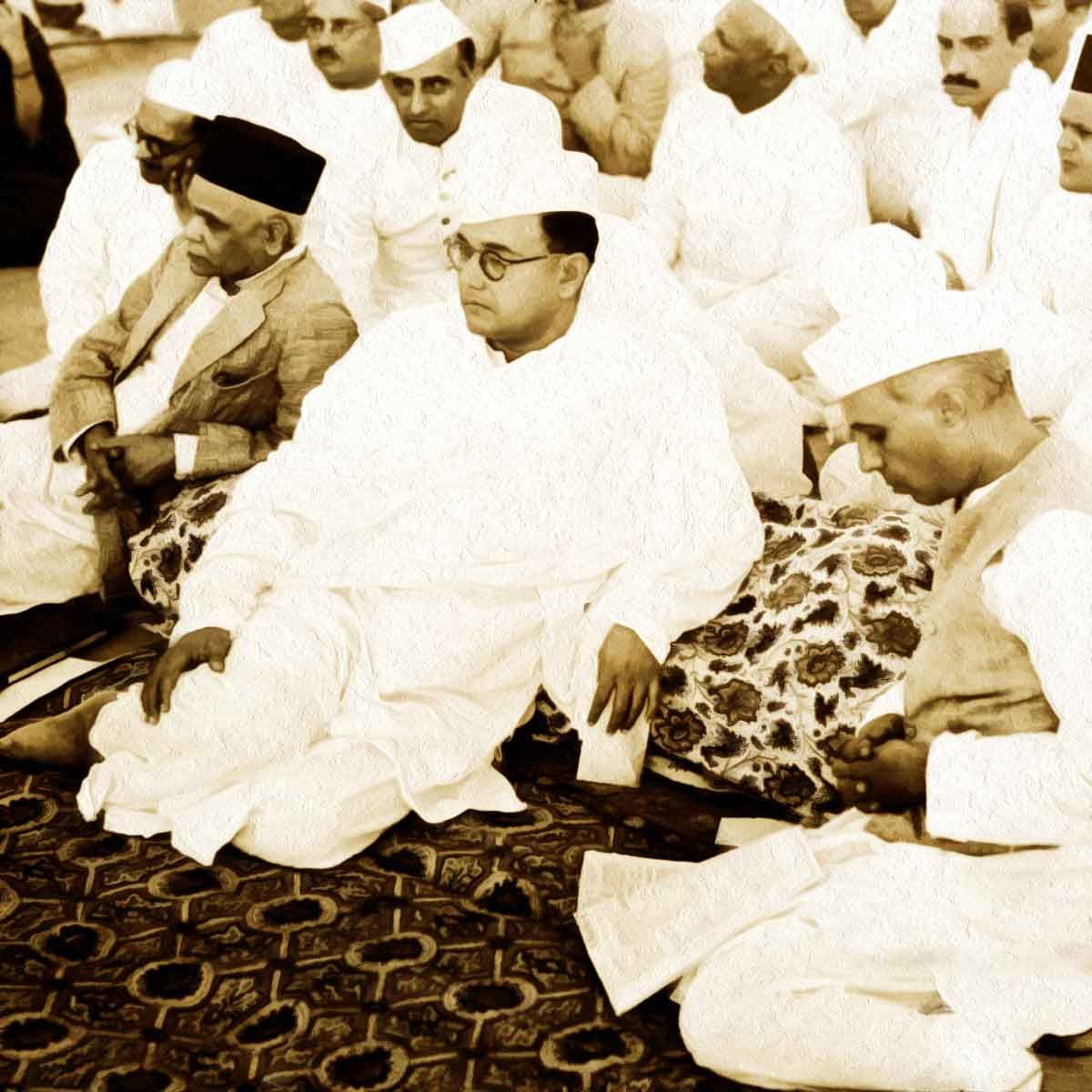
A day after Prime Minister Narendra Modi announced that a grand statue of Netaji Subhas Chandra Bose will be installed at India Gate on the occasion of his 125th birth anniversary, British author and journalist Tunku Varadarajan tried to tarnish the image of India’s iconic freedom fighter.
In a tweet on Saturday (January 22), he claimed, “The statue of a man who was pals with Hitler is going to sully India Gate in New Delhi.” Tunku Varadarajan insinuated that Netaji Subhas Chandra Bose was somehow ‘friends’ with Hitler and supposedly embodied his vicious ideology of Nazism. He suggested that the statue of such a man at India Gate would undermine the sanctity of the historical site.
|
Varadarajan then took potshots at the incumbent Modi government and also attempted to mock Subhas Chandra Bose, whose death remains a mystery to date. The British journalist further reiterated that Netaji somehow ‘consorted’ with former German dictator Adolf Hitler.
|
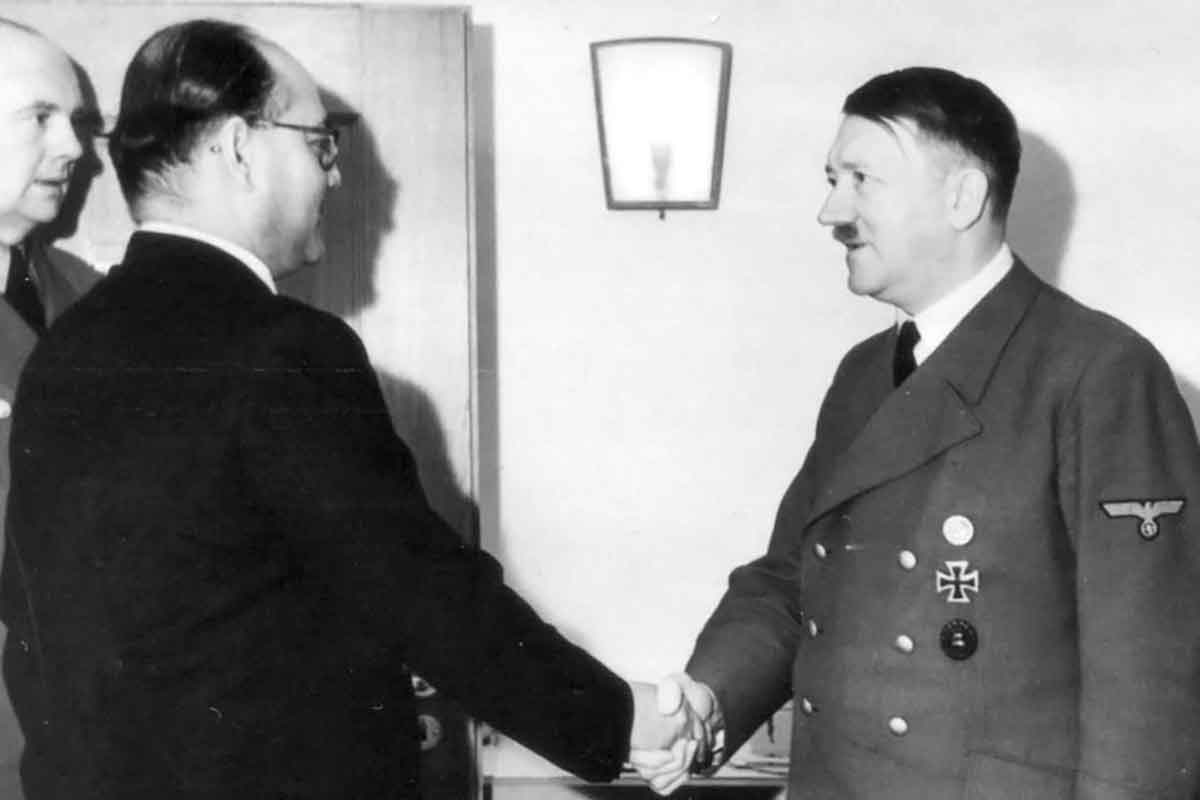 |
Vicious campaign to delegitimise Modi Government’s effort to immortalise the legacy of Netaji Subhash Chandra Bose
From being called a ‘flawed hero’ to a ‘Nazi sympathiser’, attempts at character assassination were made systematically after the incumbent Modi government sought to preserve the legacy of Netaji. Tunku Varadarajan is the latest entrant in the list of people who have been carrying out a sinister agenda since 2014 to malign the legacy of Netaji Subhas Chandra Bose. The Indian freedom fighter has earlier been dubbed as a ‘Japanese agent’ by former Supreme Court judge Marakandey Katju.
In his reply to the Motion of Thanks by President Ram Nath Kovind in Rajya Sabha last year, PM Narendra Modi referred to freedom fighter Netaji Subhas Chandra Bose as the ‘First Prime Minister’ of India. Earlier, the Indian government announced that Netaji Subhas Chandra Bose’s birth anniversary will be celebrated as ‘Parakram Diwas’ every year.
In January 2019, PM Modi had inaugurated a museum of Netaji at the Red fort. He had also renamed three islands of the Andaman & Nicobar Islands after the legendary freedom fighter. The Ross Island was renamed to Netaji Subhash Chandra Bose Island, Neil Island to Shahid Dweep and Havelock Island to Swaraj Dweep. A ₹75 commemorative coin was also released to mark the 75th anniversary of the first hoisting of the Tricolour by Netaji Subhash Chandra Bose at Port Blair.
While speaking at the Victoria Memorial Hall last year, PM Modi had said, “I sometimes wonder how Netaji would have felt had he seen how a new and strong India is taking shape. From the LAC to LoC, the world is witnessing a strong India that was once envisioned by Netaji. India today is giving a befitting reply wherever attempts are made to challenge its sovereignty.”
What did Netaji think of the Nazi Regime?
Historical events of one era might appear contentious in another and hence they need to be analysed in their rightful context. The actions of the Indian freedom fighter therefore must be judged, keeping in mind the volatile political situation of that era. Netaji visited Germany in 1933 and was disillusioned at the discriminatory and racially biased policies of German dictator Adolf Hitler. This becomes evident from his letter to Dr Thierfelder of the Deutsche Academie in 1936.
Bose wrote, “When I first visited Germany in 1933, I had hopes that the new German nation which had risen to consciousness of its national strength & self-respect would instinctively feel deep sympathy for other nations struggling in the same direction. Today I regret that I have to return to India with the conviction that the new nationalism in Germany is not only narrow and selfish, but arrogant… The new racial philosophy which has a very weak scientific foundation stands for the glorification of the white races in general, and the German race in particular”.
 |
The motivation behind meeting Adolf Hitler
On the 29th of January, 1939, Subhas Chandra Bose was appointed the president of Congress, having defeated Pattabhi Sitaramaiya by 1580-1377 votes. MK Gandhi, dropping all the pretence of neutrality, had then declared that Sitaramaiyya’s defeat was his defeat. The old guard and Gandhi loyalists got to work almost immediately blocking the newly-appointed President at every step.
Stifled and crippled as a notional president, Subhas Chandra Bose resigned later that year in September 1939. It became clear to him that his fight for Independence had no takers in the grand old party. Netaji thus travelled to Berlin in April 1941. “The prime idea which motivated Netaji was to explore all possible means for achieving the cherished goal of India’s independence. It seems that he had adopted the concept that the ‘enemy’s enemy is your friend’. He looked at Nazi Germany solely from that perspective,” wrote Sisir K Majumdar.
In a memorandum presented to the German government in April-May of that year, Netaji wanted recognition of ‘Free Indian government in Exile’ from the government. He wanted the Germans to sign a treaty stating that The Axis Powers would ensure Indian Independence after the victory in the war. Netaji also sought the constitution of the Indian Army comprising of 50,000 soldiers and handed over the responsibility of liberated India to him.
However, the German government was wary of Netaji and were reluctant to discuss military plans with him. “His movements were under constant surveillance, his telephone was tapped, his letters were opened and censored. He seemed to be locked in an iron cage, an unbearable condition for the Springing Tiger.” Netaji did not lose hope and wanted to meet Hitler to discuss plans to advance the cause of India’s Independence.
The encounter with the German dictator finally took place at the Reich Chancellery on May 29, 1942. The meeting was rather ‘unpleasant’ during which Hitler spewed his national chauvinism and claimed that it would take 100-200 years for India to put their house in order. Netaji asked Hitler to withdraw his anti-India comments from his autobiography, ‘Mein Kampf’ or else the enemies would use it for anti-german propaganda in India.
Hitler was unmoved. Sisir K Majumdar pointed out, “It was not a meeting of two national leaders, rather it was a frosty encounter between Hitler the demon-genius and Netaji, a nationalist giant. Netaji spoke very little to his colleagues in Berlin about his unpleasant meeting with Hitler, except that it was not possible to continue a logical dialogue with him. After this episode, Netaji seemed to awaken from his illusion about Hitler.”
Netaji then used his time in Germany and the financial grant of the Fuhrer to recruit the first unit of the Indian National Army (INA). It comprised Indian prisoners of war from North Africa. The legendary freedom fighter understood the significance of sovereignty and wanted to make the Indian legion self-sufficient to fight only against the British army and not for other countries including Germany. During the 2 year period he lived in Germany, Netaji’s focus remained on using the Indian Independence Movement and not carrying out Hitler’s nefarious designs.
“In March 1945, when (Father of modern Day Myanmar) Aung San and his AFPEL had started the anti-Japanese resistance struggle, the Japanese wrote to Subhas Chandra secretly that he with his INA should now suddenly attack Aung San and his forces. Subhas Chandra bluntly refused saying that he differed with Aung San but his INA would never take up arms against freedom fighters of another country. These evidences should be enough to show what really was the attitude of the various Axis Powers towards Subhas Chandra Bose and his heroic efforts to liberate India with the help of an Indian Liberation Army. They also showed the principled and courageous stand that Subhas Chandra Bose adopted vis a vis some of the policies of the Axis Powers and how that percolated into the ranks of his most dedicated followers who, as in the case of the ten brave officers of the Indian Legion, preferred death by a Nazi firing squad to dishonour,” wrote Gautam Chattopadhyay.
 |
MK Gandhi was pen-pals with Adolf Hitler
Several well-known political figures of that era had contacted Adolf Hitler for reasons that were insignificant as compared to Bose’s objective of achieving Indian Independence through German aid. One such personality was the ‘Father of the Nation’ aka MK Gandhi. He wrote his first letter to Hitler on July 23, 1939. Gandhi informed Fuhrer that his friends had urged been urging him to write a letter to him for the sake of humanity but had resisted until then as Gandhi felt that any letter would be an ‘impertinence’.
In his book ‘Why I Killed The Mahatma’, Koenraad Elst pointed out that this circumspection on Gandhi’s part was not bourn out of abhorrence for Hitler, but modesty. The last line of his letter where he asked for forgiveness if he erred by writing to him was also considered modesty and scruples by Elst. He also said that while this approach of Gandhi was condemned by many, and several believed that it provided Hitler with a carte blanche option, had Gandhi’s method worked, it would have stopped the deportation and genocide of Jews.
MK Gandhi’s second letter to Hitler came on the eve of Christmas (December 24, 1940). At that time, Germany and Italy controlled most of Europe, the German-Soviet pact was still in place under Churchill and Great Britain was continuing its war against Germany for the invasion of Poland in 1939.
In this letter, Gandhi explained in detail his reasons for referring to Hitler as ‘my friend’ and signing both the letters off with ‘Your Sincere Friend’. Gandhi said that the fact that he addressed Hitler as a ‘dear friend’ was no formality because he owned no foes and that his business in 33 years had been to earn the friendship of entire humanity irrespective of caste, colour, creed, religion and race. Gandhi had gone on to call that approach the ‘doctrine of universal friendship’.
Gandhi vehemently reiterated that he had no doubts about Hitler’s bravery or his commitment to his motherland. He also shunned the popular public opinion that Hitler was a ‘monster’ as described by his opponents. However, Gandhi conceded that some of Hitler’sacts and writings were monstrous, especially, to someone like him who considers the principle of universal friendship a way of life.
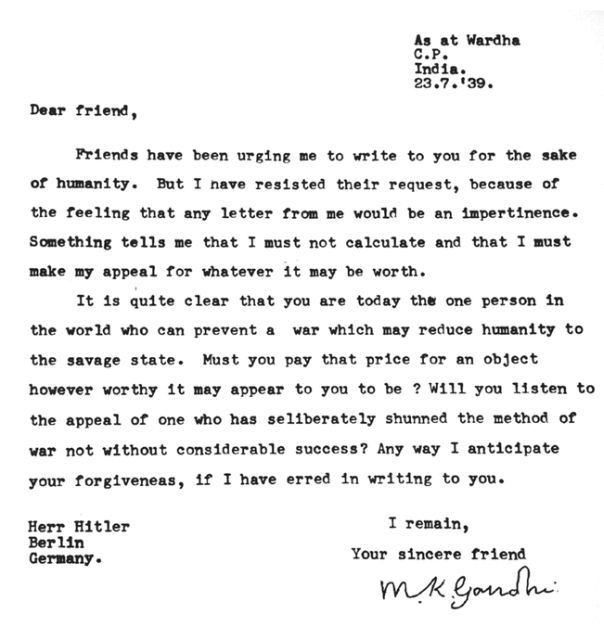 Gandhi’s letter to Hitler, 1939 (Source: Wikimedia Commons) |
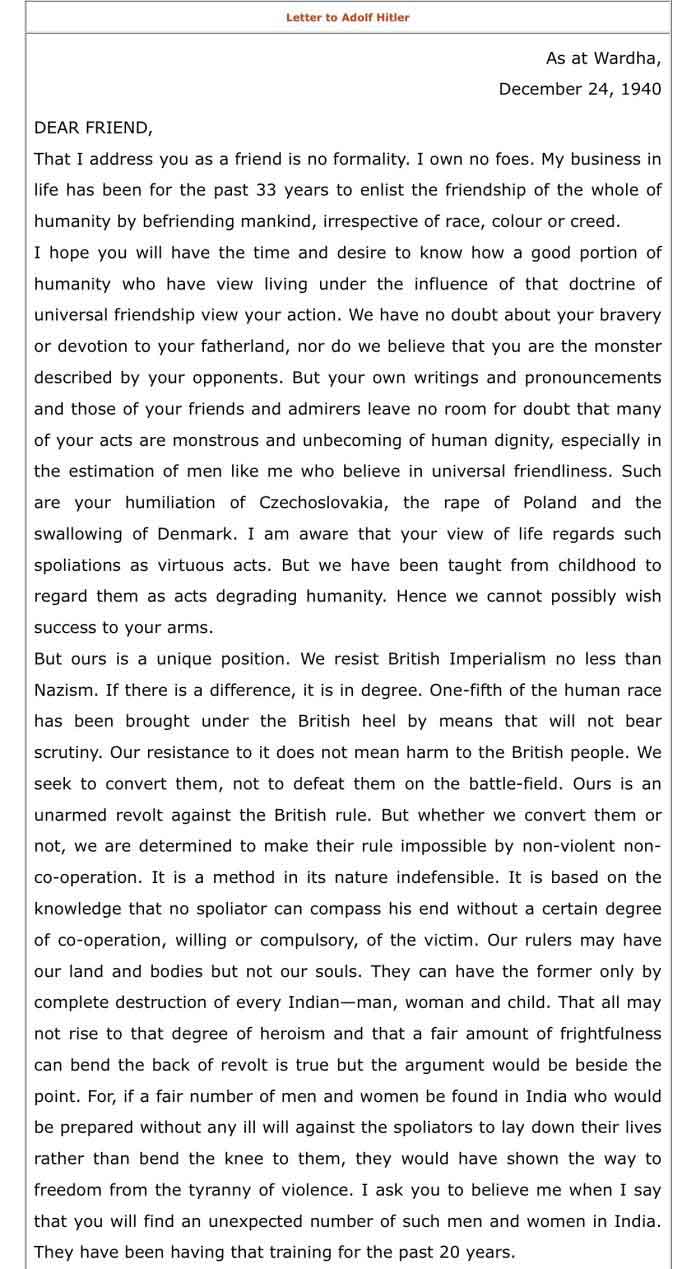 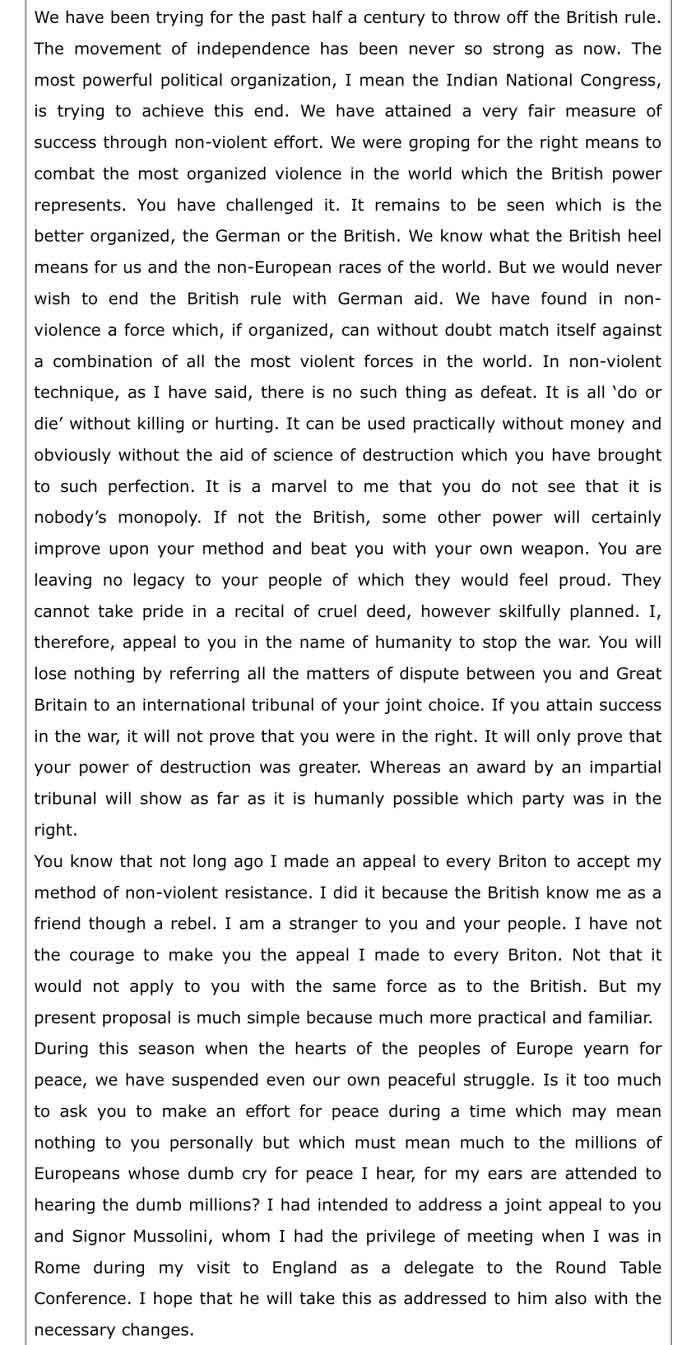 The second letter written to Adolf Hitler by MK Gandhi (Source: Opindia) |
Understanding the missing context
Despite being pen pals with the killer of millions of Jews, Mahatma Gandhi is hailed as the ‘Father of Nation’ in India. He prominently features in the Indian currency, irrespective of denomination, and his philosophy of ‘non-violence (Ahimsa)’ is revered across the globe. This is because Mahatma Gandhi is remembered in the context of his contribution to the Indian freedom movement.
He did not condone or endorse the actions of Hitler and thus remained immune from popular criticism. But, if someone was to apply the flawed rationale of Tunku Varadarajan, all currency notes and monuments of Gandhi would have to be defaced. When historical events are analysed without context for political vendetta, it indeed sullies one’s ability to use mental faculties to the fullest.
Netaji Subhas Chandra Bose was vocal against the notion of Hitler’s racial superiority and abhorred the Nazi regime. But when it came to freeing his motherland from foreign occupation, he had to seek help from the then German government (which was a part of the Axis powers and fought the British). Netaji’s commitment to his nation’s Independence was supreme, and the brief association with Hitler should not be inferred as his support to the Jewish pogrom. Due to his immense contribution to the Indian freedom movement, Netaji deserves a mammoth granite statue at the India Gate.
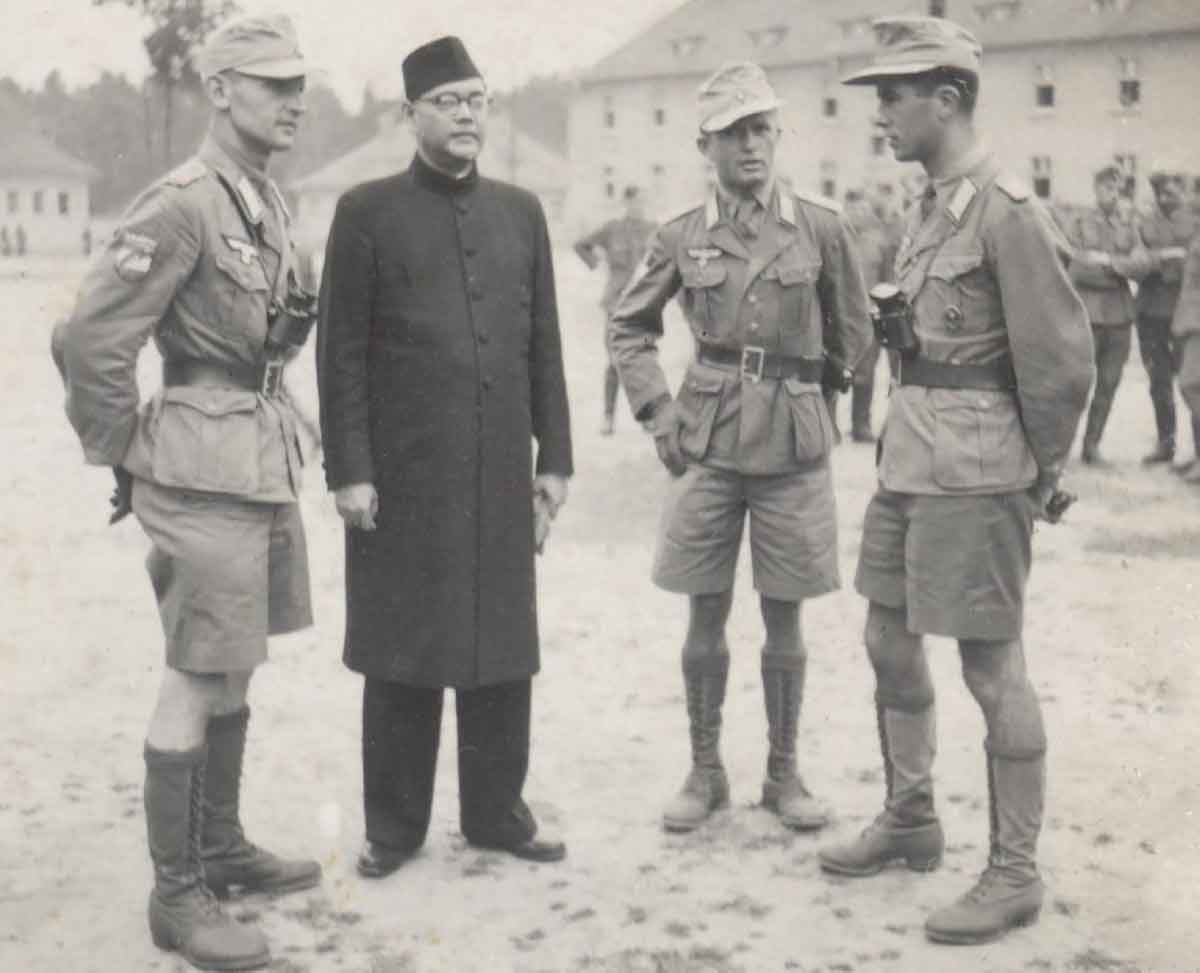 |
References:
CHATTOPADHYAY, G. (1996). HOW THE AXIS POWERS VIEWED SUBHAS CHANDRA BOSE AND HIS ACTIVITIES (1941-45). Proceedings of the Indian History Congress, 57, 846–849. jstor.org
 Support Us
Support Us
Satyagraha was born from the heart of our land, with an undying aim to unveil the true essence of Bharat. It seeks to illuminate the hidden tales of our valiant freedom fighters and the rich chronicles that haven't yet sung their complete melody in the mainstream.
While platforms like NDTV and 'The Wire' effortlessly garner funds under the banner of safeguarding democracy, we at Satyagraha walk a different path. Our strength and resonance come from you. In this journey to weave a stronger Bharat, every little contribution amplifies our voice. Let's come together, contribute as you can, and champion the true spirit of our nation.
 |  |  |
| ICICI Bank of Satyaagrah | Razorpay Bank of Satyaagrah | PayPal Bank of Satyaagrah - For International Payments |
If all above doesn't work, then try the LINK below:
Please share the article on other platforms
DISCLAIMER: The author is solely responsible for the views expressed in this article. The author carries the responsibility for citing and/or licensing of images utilized within the text. The website also frequently uses non-commercial images for representational purposes only in line with the article. We are not responsible for the authenticity of such images. If some images have a copyright issue, we request the person/entity to contact us at This email address is being protected from spambots. You need JavaScript enabled to view it. and we will take the necessary actions to resolve the issue.
Related Articles
- 'Muh me ram bagal me chhuri' - Gandhi’s politics is hollow and noisy, full of treachery and deceit’: Read what Dr. Ambedkar said about the ‘Mahatma’
- George Soros’s Open Society Foundation-funded Institute Peace Research Institute Oslo (PRIO) names Open Society functionary Harsh Mander in unofficial shortlist for Nobel prize
- Gandhi was created as 'Mahatma' by British Order in a pre-independence Bharat on 2 Sept 1938 - A 'made to order' Mahatma, a Pied Piper for the Hindus
- Crowdfunding platforms used by Kanhaiya Kumar, Dr Kafeel Khan and Saket Gokhale disappeared mysteriously after collecting funds from public
- Controversial conference co-sponsored by Massey University to advocate abolishment of Hindu Dharma
- Father of the Nation! Absolutely not. Mohandas Karamchand Gandhi was not the father of the nation either officially or otherwise
- Netflix CEO Reed Hastings expressed his ‘frustration’ over its poor performance in India after shares plummet by 21%, netizens were quick to show the mirror to the streaming platform and blamed its ‘woke bullsh*t’ content
- If not for Muslim appeasement, Vande Mataram would have been India's National Anthem: the history of Muslim opposition and support
- Lets take a new year resolution together to liberate Bharatiya history from the paws of colonial effect
- While Shaheen Bagh showcases its latest artwork for anti-CAA 'protest', it also reveals its true nature of Islamist supremacy and Hinduphobia: Adds image of Hindu Swastika being ‘smashed’ and disintegrating
- Indian state bans book on Mahatama Gandhi after reviews hint at his gay relationship
- Due To Contract Marriage Fraud 3600 Punjab Men Have Been Duped Of Rs 150 Crore In Last 5-Years: An extremely worrying trend where Men are cheated, looted and dumped by local women
- Hitler’s propaganda minister Joseph Goebbels said 'Repeat a lie often enough and it becomes the truth' - Whitewashing a genocide – how the exodus of Kashmiri Pandits is being blamed on Hindus instead of on Islamists
- If only India’s partition chilling wound was not enough, Gandhi did his last protest again only to blackmail India into giving 55 crores to Pakistan, dragged Hindu, Sikh refugees seeking shelter in mosques to die in cold: And we call him Mahatma, not for
- To be on the wrong side of history is a choice – How 21st-century invaders are capturing Chhatrapati Shivaji’s forts the way even Mughals didn’t and attempting to reclaim an invader identity unapologetically




























